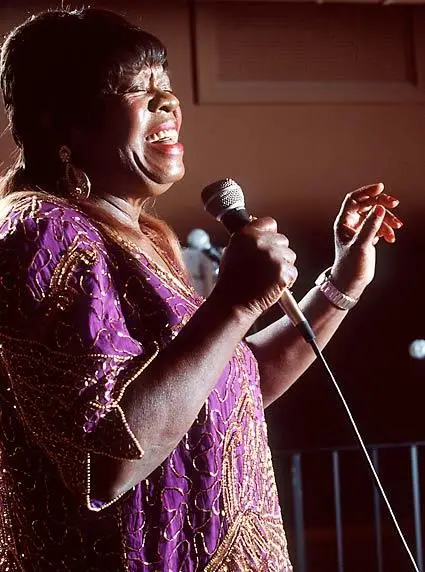10 Famous Female Blues Singers You Need to Know

The blues is a genre of music that originated in African-American communities in the Deep South of the United States around the end of the 19th century. It is characterized by its use of the 12-bar blues chord progression, blue notes, and lyrics that often deal with themes of hardship, loss, and heartbreak.
Female blues singers have played a major role in the development of the genre, and many of them are considered to be among the most influential blues artists of all time. Some of the most famous female blues singers include:
Famous female blues singers – Introduction
From its humble beginnings as a musical expression of hardship and resilience among African Americans in the early 20th century, the blues has evolved into a powerful and influential genre that has captivated audiences worldwide. Female blues singers have played a pivotal role in shaping the sound and identity of the blues, bringing their unique perspectives, experiences, and vocal prowess to the forefront of this iconic genre.

These trailblazing women have not only entertained but also empowered generations with their soul-stirring music, challenging societal norms and giving voice to the marginalized. Their stories, infused with passion, heartache, and hope, continue to resonate deeply, transcending cultural and generational boundaries.
Let’s delve into the lives and legacies of some of the most celebrated female blues singers who have left an indelible mark on the world of music:
Bessie Smith
Known as the “Empress of the Blues,” Bessie Smith was one of the first female blues singers to gain widespread recognition and success. Born in Chattanooga, Tennessee in 1894, she began her career as a street performer and later joined traveling shows and vaudeville acts. In 1923, Smith signed a record deal with Columbia Records and soon became one of the top-selling blues artists of the 1920s.
Early Life and Career
Bessie Smith grew up in poverty and faced many challenges in her early life. Her father passed away when she was young, and she was raised by her mother and older sister. She started her career as a dancer in traveling shows and eventually transitioned to singing after joining Ma Rainey’s Rabbit Foot Minstrels. It was during this time that she honed her skills as a blues singer and developed her signature style.
In 1923, Smith recorded her first single, “Gulf Coast Blues,” which became a hit and sold over 780,000 copies. This success led to a string of successful recordings, including “Downhearted Blues,” which sold over two million copies and became her most popular song. Smith’s powerful voice and emotionally charged performances made her a sensation and helped her become one of the highest-paid black entertainers of the time.
The Impact of Chuck Berry and Linda Ronstadt on the Music Industry
Legacy and Impact
Bessie Smith’s legacy extends far beyond her music. She was one of the first female blues singers to achieve mainstream success and paved the way for future generations of female artists. Her songs often tackled themes of love, heartache, and independence, which resonated with many women and inspired them to pursue their dreams despite societal limitations.
Smith’s influence can still be seen today in the work of artists like Janis Joplin, who covered her song “Nobody Knows You When You’re Down and Out.” In 1989, Bessie Smith was posthumously inducted into the Rock and Roll Hall of Fame, solidifying her place as one of the most influential female blues singers of all time.
Ma Rainey
Known as the “Mother of the Blues,” Ma Rainey was another pioneer in the world of blues music. Born Gertrude Pridgett in Columbus, Georgia in 1886, she began her singing career at the age of 14 and soon became known for her powerful voice and energetic performances. Rainey’s unique blend of blues, jazz, and vaudeville made her a star in the 1920s and earned her the title of the “Queen of the Blues.”

Early Life and Career
Ma Rainey’s musical journey began when she joined a traveling show at the age of 14. She toured extensively and gained a reputation for her soulful voice and dynamic stage presence. In 1923, she signed with Paramount Records and released over 100 recordings during her career. Her most famous songs include “Ma Rainey’s Black Bottom” and “Prove It On Me Blues.”
Rainey was one of the first blues singers to perform with a band, which was uncommon for women at the time. She also mentored and supported other female artists, such as Bessie Smith and Ethel Waters, and helped them launch their careers. Despite her success, Ma Rainey faced discrimination and prejudice due to her race and gender, but she continued to perform and make a name for herself in the music industry.

Legacy and Impact
Ma Rainey’s influence on the blues genre is immeasurable. She was an inspiration for future generations of female artists and helped pave the way for black musicians in the entertainment industry. Her bold and unapologetic style, both in her music and her personal life, challenged societal norms and broke barriers for women in the music industry.
Rainey’s legacy can be seen in the work of artists like Beyoncé, who paid tribute to her in her album Lemonade. In 1990, she was posthumously inducted into the Blues Hall of Fame, and in 2010, her life was depicted in the play “Ma Rainey’s Black Bottom” by August Wilson. Ma Rainey will always be remembered as a trailblazer and an icon in the world of blues music.

Mamie Smith
Mamie Smith was another important figure in the early days of blues music and is often referred to as the first professional female blues singer. Born in Cincinnati, Ohio, in 1883, she began her singing career in minstrel shows and vaudeville acts before finding success as a recording artist. In 1920, she became the first black woman to record a blues song, “Crazy Blues,” which sold over a million copies.

Early Life and Career
Mamie Smith started her career as a dancer and performed in traveling shows and vaudeville acts across the United States. In 1920, she caught the attention of Okeh Records, who offered her a recording contract. This opportunity allowed Smith to showcase her powerful voice and unique style and opened doors for other black female artists in the music industry.
“Crazy Blues” was a massive success and became the first blues song recorded by a black artist to sell over a million copies. This achievement helped legitimize blues music and paved the way for future female blues singers to gain recognition and success in the industry. Mamie Smith went on to record many more songs and became one of the highest-paid black entertainers of the 1920s.

Legacy and Impact
Mamie Smith’s contribution to the development of blues music cannot be understated. She was one of the first female artists to record a blues song and helped bring the genre into the mainstream. Her success opened doors for other black female artists and inspired them to pursue careers in the music industry.
Smith’s legacy lives on through her music and her impact on the blues genre. In 1991, she was posthumously inducted into the Blues Hall of Fame, and her song “Crazy Blues” was inducted into the Grammy Hall of Fame in 1994. Mamie Smith will always be remembered as a pioneer in the world of blues music.

Billie Holiday
Billie Holiday, also known as “Lady Day,” is one of the most iconic and influential jazz and blues singers of all time. Born Eleanora Fagan in Philadelphia, Pennsylvania in 1915, she had a tumultuous childhood and found solace in music from a young age. Her distinctive voice and emotional delivery captivated audiences and made her one of the most celebrated performers of her time.
Early Life and Career
Billie Holiday’s early life was filled with challenges, and she often turned to music as an escape. At the age of 12, she dropped out of school and started singing in nightclubs, where she was discovered by John Hammond, a record producer. In 1933, she recorded her first single, “Your Mother’s Son-In-Law,” and soon gained recognition for her unique style and powerful voice.

Holiday’s career took off in the 1930s, and she became known for her soulful ballads and emotionally charged performances. She recorded several hits, including “Strange Fruit” and “God Bless the Child,” which solidified her place as one of the most influential artists of her time. Despite her success, she faced discrimination and struggled with drug addiction throughout her life.
Legacy and Impact
Billie Holiday’s impact on the world of music cannot be overstated. Her distinct vocal style and emotional depth continue to influence artists today, and her songs are considered timeless classics. She was also an advocate for racial equality and used her platform to raise awareness about social issues.

Holiday’s legacy extends far beyond her music. In 1987, she was posthumously inducted into the Rock and Roll Hall of Fame, and her song “Strange Fruit” was inducted into the Grammy Hall of Fame in 1978. Her life has been depicted in numerous films and plays, cementing her place as one of the most iconic female blues singers of all time.
Etta James
Etta James, also known as the “Matriarch of RB,” had a career that spanned over six decades and left a lasting impact on the world of music. Born Jamesetta Hawkins in Los Angeles, California in 1938, she began her career at the age of 14 and quickly gained recognition for her powerful vocals and soulful style. Her crossover success in both blues and RB made her a household name and earned her a spot in the Rock and Roll Hall of Fame.
Early Life and Career
Etta James grew up in a poverty-stricken household and turned to music as an escape. She started singing in church and later joined a doo-wop group, which led to her first recording contract at the age of 14. In 1955, she recorded her first hit, “The Wallflower (Dance with Me Henry),” which topped the RB charts and launched her career as a solo artist.

Throughout her career, James recorded numerous hits, including “At Last,” “I’d Rather Go Blind,” and “Something’s Got a Hold on Me.” Her powerful voice and versatile style allowed her to experiment with different genres, including blues, RB, and rock and roll. Her influence can be seen in the work of artists like Adele and Christina Aguilera, who have cited her as one of their inspirations.
Legacy and Impact
Etta James’ musical legacy lives on through her timeless songs and her impact on the industry. She was a trailblazer for female artists in the male-dominated world of RB and blues music. In 1993, she was inducted into the Rock and Roll Hall of Fame, and in 2003, she received a Grammy Lifetime Achievement Award. Etta James will always be remembered as one of the greatest female blues singers of all time.

Koko Taylor
Koko Taylor, also known as the “Queen of the Blues,” was a force to be reckoned with in the world of blues music. Born Cora Walton in Memphis, Tennessee in 1928, she rose to fame in the 1960s and became known for her powerful vocals and energetic stage presence. Taylor’s unique blend of blues, soul, and gospel made her a legend in the genre, and she won numerous awards throughout her career, including a Grammy for Best Traditional Blues Album.

Early Life and Career
Koko Taylor grew up in a sharecropping family and started singing in church at a young age. In the 1950s, she moved to Chicago and started performing in blues clubs, where she caught the attention of Chess Records producer Willie Dixon. In 1962, she recorded her first hit, “Wang Dang Doodle,” which became a number one hit on the RB charts and made her a star.

Throughout her career, Taylor recorded over 20 albums and became a household name in the world of blues music. She was known for her powerful voice, which she described as “a mixture of gravel, grit, and guts.” Her legacy lives on through her songs and her influence on future generations of female blues singers.
Legacy and Impact
Koko Taylor’s impact on the blues genre cannot be overstated. She was an inspiration for many female artists and helped pave the way for women in the male-dominated blues scene. In 1985, she became the first woman to receive a Lifetime Achievement Award from the Blues Foundation. Koko Taylor will always be remembered as one of the greatest female blues singers of all time.

Big Mama Thornton
Willie Mae “Big Mama” Thornton was a pioneer in the world of blues and is often referred to as the “Original Queen of the Blues.” Born in Alabama in 1926, she began her career as a drummer but soon transitioned to singing after moving to Houston, Texas. With her deep, powerful voice and commanding stage presence, Thornton became one of the most influential female blues singers of the 1950s.

Early Life and Career
Big Mama Thornton’s musical journey began when she joined Sammy Green’s Hot Harlem Revue as a drummer in the early 1940s. In 1951, she moved to Houston and started her solo career, which led to her first hit, “Hound Dog,” in 1953. The song was later covered by Elvis Presley and became a massive hit, but Thornton never received royalties for the song.

Throughout her career, Big Mama Thornton recorded several hits, including “Ball and Chain,” which was later covered by Janis Joplin. She also toured extensively and performed alongside other blues legends like Muddy Waters and B.B. King. Her powerful voice and dynamic stage presence made her a force to be reckoned with in the world of blues music.
Legacy and Impact
Big Mama Thornton’s legacy lives on through her timeless songs and her impact on the blues genre. She was an inspiration for many female artists and helped break down barriers for women in the music industry. In 1984, she received a Blues Music Award for Traditional Female Artist of the Year, and in 2015, she was posthumously inducted into the Blues Hall of Fame.

Ruth Brown
Known as the “Queen of RB,” Ruth Brown had a successful career that spanned over five decades and left a lasting impression on the world of music. Born in Portsmouth, Virginia in 1928, she started singing at a young age and became known for her soulful voice and energetic performances. She was one of the first female artists signed to Atlantic Records and is considered a pioneer in the development of the RB genre.

Early Life and Career
Ruth Brown’s musical career began when she joined a local gospel group at the age of 15. In 1948, she was discovered by Johnny Otis and soon signed a recording contract with Atlantic Records. Her first hit, “So Long,” topped the RB charts in 1949 and launched her career as a solo artist. Throughout the 1950s, she recorded numerous hits, including “Mama, He Treats Your Daughter Mean” and “(Mama) He Treats Your Daughter Mean.”

Brown’s success continued throughout the 1960s and 1970s, and she also ventured into acting, appearing in several films and Broadway productions. She was one of the first female artists to receive a Grammy Award for her song “Teardrops from My Eyes” in 1955. Her legacy lives on through her music and her impact on the RB genre.

Legacy and Impact
Ruth Brown’s impact on the world of music is undeniable. She was a pioneer for women in the male-dominated music industry and helped pave the way for future generations of female artists. In 1989, she was posthumously inducted into the Rock and Roll Hall of Fame, and in 1993, she received a Grammy Lifetime Achievement Award. Ruth Brown will always be remembered as one of the most influential female blues singers of all time.
Introduction to Famous Blues Singers
Dinah Washington
Dinah Washington, also known as the “Queen of the Blues,” was another influential figure in the world of music. Born Ruth Lee Jones in Tuscaloosa, Alabama in 1924, she began singing and playing piano at a young age and soon gained recognition for her powerful voice and unique style. Throughout her career, she recorded over 50 albums and became one of the highest-paid black female artists of the 1950s.
Early Life and Career
Dinah Washington’s musical journey began when she joined her church choir at the age of five. In 1942, she moved to Chicago and started performing in nightclubs under the name Dinah Washington. In 1948, she signed with Mercury Records and recorded her first hit, “Baby Get Lost,” which topped the RB charts.

Throughout her career, Washington recorded numerous hits, including “What a Difference a Day Makes” and “This Bitter Earth.” She also collaborated with other prominent artists, such as Brook Benton and Quincy Jones. Her powerful voice and ability to blend different genres, including blues, pop, and jazz, set her apart from other female blues singers of her time.
Legacy and Impact
Dinah Washington’s legacy lives on through her music and her impact on the world of blues and jazz. She was an inspiration for many female artists and helped break down barriers for women in the music industry. In 1993, she was posthumously inducted into the Rock and Roll Hall of Fame, and in 2000, she received a Grammy Lifetime Achievement Award. Dinah Washington will always be remembered as one of the greatest female blues singers of all time.
Aretha Franklin
Known as the “Queen of Soul,” Aretha Franklin has had a career that spanned over six decades and left an indelible mark on the world of music. Born in Memphis, Tennessee in 1942, she grew up singing in her father’s church and soon became known for her powerful vocals and gospel-inspired sound. Franklin’s unique blend of soul, RB, and blues made her one of the most celebrated performers of her time.

Early Life and Career
Aretha Franklin’s early life was surrounded by music, and she started learning how to play the piano at a young age. In 1960, she signed with Columbia Records and released several albums, but it wasn’t until she moved to Atlantic Records in 1967 that she achieved mainstream success. Her hit songs, including “Respect” and “Chain of Fools,” topped the charts and earned her a spot among the top female artists of the 1960s.

Throughout her career, Franklin continued to produce hit songs and became a cultural icon. She received numerous accolades, including 18 Grammy Awards and the Presidential Medal of Freedom in 2005. Her powerful voice and ability to infuse emotion into her music set her apart as one of the greatest female blues singers of all time.

Legacy and Impact
Aretha Franklin’s legacy is one of resilience, talent, and passion for music. She broke barriers for women in the music industry and inspired countless artists with her soulful voice and iconic performances. In 1987, she was inducted into the Rock and Roll Hall of Fame, and in 2019, she was posthumously awarded a Pulitzer Prize Special Citation for her “indelible contribution to American music and culture.” Aretha Franklin will always be remembered as one of the most influential and admired female blues singers in history.

Conclusion
The contributions of these incredible women to the world of blues music cannot be overstated. Bessie Smith, Ma Rainey, Mamie Smith, Billie Holiday, Etta James, Koko Taylor, Big Mama Thornton, Ruth Brown, Dinah Washington, and Aretha Franklin paved the way for future generations of female artists and left an indelible mark on the genre.
Their powerful voices, dynamic stage presence, and unique styles continue to inspire and influence musicians around the world. These women will forever be remembered as some of the greatest female blues singers of all time.








